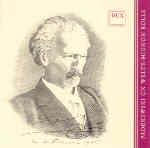Did Paderewski really record all 16 of his 1906 Welte-Mignon piano rolls on the same day? That’s a lot of work, even for a pianist who by all accounts gave arduous concerts and practiced hours on end. Although piano rolls could be edited to achieve note-perfect results, the dynamic and pedal limitations and sundry mechanical quirks cannot possibly reproduce what pianists really sounded like. I compared each selection whenever possible with Paderewski’s flat disc versions of the same pieces. What a difference! The flat discs, for all their sonic and sometimes artistic limitations, are infinitely more lifelike and realistic.
Compare the choppy, lurching rhythms and total lack of line, phrasing, and musicality in the piano roll rendition of Paderewski’s wistful Op. 16 Nocturne (he was a better composer than his ubiquitous Minuet in G, also included here, leads us to believe) with his limpid, graceful version on an old RCA Victor 78: no contest. On shellac, the pianist’s deft foreground/background differentiation in Liszt’s 10th Hungarian Rhapsody contrasts to the bland, notey, and rhythmically haywire piano roll. Even Paderewski’s old-fashioned mannerisms throughout Schubert’s B-flat Impromptu (ceaseless breaking of the hands, vulgar rubatos that foreshadow Liberace at his nadir, and gratuitous textual changes) sound more tolerable on 78.
Granted, Paderewski’s 1937 HMV Beethoven “Moonlight” Sonata found the old lion hanging onto the music by his thumbs, but even the more note-accurate piano roll version features metric and stylish gaucheries that fall uncomfortably on modern ears. Of the Chopin selections (including two Etudes, the G major Nocturne Op. 37 No. 2, the C-sharp minor Waltz, and the A-flat Polonaise), the A-flat Ballade is interesting chiefly because Paderewski didn’t otherwise record it. It’s full of arbitrary, roller-coaster tempo changes, and the pianist’s hands move in a near-constant state of untogetherness. Still, I find the opening section’s outsized rhetoric weirdly compelling–although you wouldn’t want to hear this more than once, or more than partway through.
While there’s no denying Paderewski was an uneven pianist, his best 78s justify his erstwhile popularity, and his reputation. His Welte-Mignon Rolls should be approached with extreme caution. My rating, therefore, reflects their artistic virtues rather than their place in history. Strange that we haven’t yet had a complete and systematic reissue of Paderewski’s complete extant disc and broadcast performances. Any takers? Pearl? Arbiter? Marston?
































